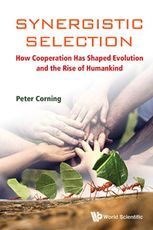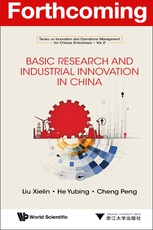
Synergistic Selection: How Cooperation Has Shaped Evolution and the Rise of Humankind
Authors : Peter Corning (Institute for the Study of Complex Systems, USA)
Publisher : World Scientific
ISBN : 978-981-3230-93-4 (Hardcover), 978-981-3234-60-4 (Softcover)
"This magnificent book reveals the critical role of synergy in evolution and in all of biology, including especially in humankind. Synergy is fundamental in so many areas of science and knowledge. And in his final chapter, on how to change our current dysfunctional course as a species and avoid the destruction of our planet, Peter Corning offers us a unique and hopeful new vision."
-- Anthony Trewavas, FRS
Emeritus Professor, Institute of Molecular Plant Science, University of Edinburgh and
author of Plant Behaviour and Intelligence
"Peter Corning's approach is wise and he is astonishingly well read. The scope of his excellent book is broad and ambitious, running from the origins of life to modern economics in human societies. Many of his examples are described in clear and fascinating detail ... He writes extremely well and I read every word with great pleasure and interest ... I am full of admiration and strongly recommend it."
-- Sir Patrick Bateson, FRS
Emeritus Professor of Biology, Cambridge University
president of the Zoological Society of London and
the author of (among others) Behaviour, Development and Evolution
"This is an important book. It offers a solution to a problem that has been central to evolutionary biology for half a century, with implications that reach down to the foundations of evolutionary theory. Corning argues that the huge and disproportionate advantages that arise when labor is combined could account for the rise of ever higher levels of organization in the history of life. The book is also well written, a pleasure to read."
-- Daniel W McShea
Professor of Biology, Duke University and
co-author of Biology's First Law
"Peter Corning's book is a marvelous addition to the growing literature about the emerging alternative to gene-centric neo-Darwinism in evolutionary biology. We would not exist were it not for the cooperative behaviour of living organisms, from microorganisms to the largest mammals and trees. The progressive evolution of multiple levels of organisation in living systems has harnessed blind chance. This book tells you how (and why) this occurred."
-- Denis Noble, CBE, FRS, FRCP, FMedSci
Burden Sanderson Chair of Cardiovascular Physiology, Oxford University, Emeritus, and
author of (among others) The Music of Life
"Evolution is the story of the development of complex organic and social systems. The key to understanding this complexity, Peter Corning shows, is synergy — fitness-enhancing cooperation among heterogeneous parts. Synergistic Selection draws on the broad history of evolutionary thinking and is buttressed by contemporary empirical evidence. It is an eloquent refutation of the standard story of 'selfish genes.' While abounding in biological detail, Synergistic Selection is easily accessible to a lay audience."
-- Herbert Gintis
External Professor, Santa Fe Institute and
co-author of (among others) A Cooperative Species
"Peter Corning's new book presents a grand view of evolution and highlights the role of synergy in the accelerating complexity of our modern world. From this vantage point, he is able to cast new light on some of the major challenges of our century — from economic inequality and political governance to climate change."
-- Geoffrey Hodgson
Research Professor of Business Studies, University of Hertfordshire
editor-in-chief of the Journal of Institutional Economics and
author of (among others) Conceptualizing Capitalism
"Peter Corning has once again given us a book that not only expertly summarizes the current state of the art in evolutionary biology, it also points the way to a compelling new understanding of how we arrived at our place in the natural world."
-- John M Gowdy
Professor of Economics and Professor of Science and Technology Studies, Rensselaer Polytechnic Institute and
co-author of Paradise for Sale
"Synergistic Selection is an important contribution to our understanding of evolution ... An essential read at the intersection of science, inspiration, and sustainability."
-- Michael Dowd
author of Thank God for Evolution and
host of "The Future Is Calling Us to Greatness"
"A brilliant, timely, and much needed contribution."
-- David Korten
co-founder & Board Chair of YES! Magazine and
author of When Corporations Rule the World
"In his new book Synergistic Selection, Peter Corning explains in an elegant and detailed way the rise of complexity in living systems over time and the major transitions in evolution. The book moves beyond neo-Darwinism and challenges the traditional selectionist approach, focusing on the role of additional evolutionary mechanisms associated with functional synergies and the emergence of evolutionary novelties."
-- Professor Francisco Carrapiço
University of Lisbon, Portugal
"In this wide-ranging and intelligent book, Peter Corning presents a grand view of the evolution of complexity, eloquently arguing that it is based on the cumulative combination of the effects of cooperation — on synergies among systems. He provides an inclusive synthesis of evolutionary theory, re-interpreting classical views of Darwinian and Lamarckian evolution in terms of evolving synergetic interactions, and offers a new way of thinking about the major transitions in evolution and about human evolution. Brave, well-written, and based on more than thirty years of deep reflection, Corning's vision stretches onto the future of our planet and our species and suggests new ways of anticipating and facing them."
-- Professor Eva Jablonka
Tel-Aviv University and
co-author of (among others) Evolution in Four Dimensions
-- Anthony Trewavas, FRS
Emeritus Professor, Institute of Molecular Plant Science, University of Edinburgh and
author of Plant Behaviour and Intelligence
"Peter Corning's approach is wise and he is astonishingly well read. The scope of his excellent book is broad and ambitious, running from the origins of life to modern economics in human societies. Many of his examples are described in clear and fascinating detail ... He writes extremely well and I read every word with great pleasure and interest ... I am full of admiration and strongly recommend it."
-- Sir Patrick Bateson, FRS
Emeritus Professor of Biology, Cambridge University
president of the Zoological Society of London and
the author of (among others) Behaviour, Development and Evolution
"This is an important book. It offers a solution to a problem that has been central to evolutionary biology for half a century, with implications that reach down to the foundations of evolutionary theory. Corning argues that the huge and disproportionate advantages that arise when labor is combined could account for the rise of ever higher levels of organization in the history of life. The book is also well written, a pleasure to read."
-- Daniel W McShea
Professor of Biology, Duke University and
co-author of Biology's First Law
"Peter Corning's book is a marvelous addition to the growing literature about the emerging alternative to gene-centric neo-Darwinism in evolutionary biology. We would not exist were it not for the cooperative behaviour of living organisms, from microorganisms to the largest mammals and trees. The progressive evolution of multiple levels of organisation in living systems has harnessed blind chance. This book tells you how (and why) this occurred."
-- Denis Noble, CBE, FRS, FRCP, FMedSci
Burden Sanderson Chair of Cardiovascular Physiology, Oxford University, Emeritus, and
author of (among others) The Music of Life
"Evolution is the story of the development of complex organic and social systems. The key to understanding this complexity, Peter Corning shows, is synergy — fitness-enhancing cooperation among heterogeneous parts. Synergistic Selection draws on the broad history of evolutionary thinking and is buttressed by contemporary empirical evidence. It is an eloquent refutation of the standard story of 'selfish genes.' While abounding in biological detail, Synergistic Selection is easily accessible to a lay audience."
-- Herbert Gintis
External Professor, Santa Fe Institute and
co-author of (among others) A Cooperative Species
"Peter Corning's new book presents a grand view of evolution and highlights the role of synergy in the accelerating complexity of our modern world. From this vantage point, he is able to cast new light on some of the major challenges of our century — from economic inequality and political governance to climate change."
-- Geoffrey Hodgson
Research Professor of Business Studies, University of Hertfordshire
editor-in-chief of the Journal of Institutional Economics and
author of (among others) Conceptualizing Capitalism
"Peter Corning has once again given us a book that not only expertly summarizes the current state of the art in evolutionary biology, it also points the way to a compelling new understanding of how we arrived at our place in the natural world."
-- John M Gowdy
Professor of Economics and Professor of Science and Technology Studies, Rensselaer Polytechnic Institute and
co-author of Paradise for Sale
"Synergistic Selection is an important contribution to our understanding of evolution ... An essential read at the intersection of science, inspiration, and sustainability."
-- Michael Dowd
author of Thank God for Evolution and
host of "The Future Is Calling Us to Greatness"
"A brilliant, timely, and much needed contribution."
-- David Korten
co-founder & Board Chair of YES! Magazine and
author of When Corporations Rule the World
"In his new book Synergistic Selection, Peter Corning explains in an elegant and detailed way the rise of complexity in living systems over time and the major transitions in evolution. The book moves beyond neo-Darwinism and challenges the traditional selectionist approach, focusing on the role of additional evolutionary mechanisms associated with functional synergies and the emergence of evolutionary novelties."
-- Professor Francisco Carrapiço
University of Lisbon, Portugal
"In this wide-ranging and intelligent book, Peter Corning presents a grand view of the evolution of complexity, eloquently arguing that it is based on the cumulative combination of the effects of cooperation — on synergies among systems. He provides an inclusive synthesis of evolutionary theory, re-interpreting classical views of Darwinian and Lamarckian evolution in terms of evolving synergetic interactions, and offers a new way of thinking about the major transitions in evolution and about human evolution. Brave, well-written, and based on more than thirty years of deep reflection, Corning's vision stretches onto the future of our planet and our species and suggests new ways of anticipating and facing them."
-- Professor Eva Jablonka
Tel-Aviv University and
co-author of (among others) Evolution in Four Dimensions
"Nothing about the evolution of biological complexity makes sense except in the light of synergy." Peter Corning's new book is being hailed as a major contribution to what is perhaps the greatest shift in our understanding of evolution since The Origin of Species. It's a tour de force that takes us on a synergy-guided tour of the history of life. As Corning puts it, "life on Earth has been a synergistic phenomenon from the get go." Corning also shows how synergy has been a key to human evolution, including the rise of complex modern societies. "Cooperation may have been the vehicle, but synergy was the driver." As we now face a tipping point and another major transition in evolution, Corning offers us a synergy-based road-map to the future. "One of the great take-home lessons from the epic of evolution is that cooperation produces synergy, and synergy is the way forward. The arc of evolution bends toward synergy."
Peter A Corning is the Director of the Institute for the Study of Complex Systems (ISCS) in Seattle, Washington. He graduated from Brown University and served as a naval aviator and a science reporter for Newsweek magazine before completing a combined social science-life science doctorate at New York University, as well as post-doctoral training in genetics under an NIMH fellowship in the Institute for Behavioral Genetics at the University of Colorado. Following this, he taught for a decade in Stanford University's Human Biology Program, along with holding research appointments in the Behavior Genetics Laboratory and the Engineering Economic Systems Department.
Dr. Corning was subsequently a senior fellow at the Collegium Budapest (Institute for Advanced Study) in Hungary before becoming the director of the ISCS. His professional affiliations include the Evolution Institute, where he is a member of the scientific advisory board, the International Society for the Systems Sciences, where he is a past-president, and the International Society for Bioeconomics, where he has served as treasurer. In addition, he has been an active member of the Human Behavior and Evolution Society, the American Society for Cybernetics, the International Society for Endocytobiology, and the International Society for Human Ethology. He is also the author of five books and more than 150 scientific papers and book chapters. More information is available at www.complexsystems.org.
Dr. Corning was subsequently a senior fellow at the Collegium Budapest (Institute for Advanced Study) in Hungary before becoming the director of the ISCS. His professional affiliations include the Evolution Institute, where he is a member of the scientific advisory board, the International Society for the Systems Sciences, where he is a past-president, and the International Society for Bioeconomics, where he has served as treasurer. In addition, he has been an active member of the Human Behavior and Evolution Society, the American Society for Cybernetics, the International Society for Endocytobiology, and the International Society for Human Ethology. He is also the author of five books and more than 150 scientific papers and book chapters. More information is available at www.complexsystems.org.
"This magnificent book reveals the critical role of synergy in evolution and in all of biology, including especially in humankind. Synergy is fundamental in so many areas of science and knowledge. And in his final chapter, on how to change our current dysfunctional course as a species and avoid the destruction of our planet, Peter Corning offers us a unique and hopeful new vision."
-- Anthony Trewavas, FRS
Emeritus Professor, Institute of Molecular Plant Science, University of Edinburgh and
author of Plant Behaviour and Intelligence
"Peter Corning's approach is wise and he is astonishingly well read. The scope of his excellent book is broad and ambitious, running from the origins of life to modern economics in human societies. Many of his examples are described in clear and fascinating detail ... He writes extremely well and I read every word with great pleasure and interest ... I am full of admiration and strongly recommend it."
-- Sir Patrick Bateson, FRS
Emeritus Professor of Biology, Cambridge University
president of the Zoological Society of London and
the author of (among others) Behaviour, Development and Evolution
"This is an important book. It offers a solution to a problem that has been central to evolutionary biology for half a century, with implications that reach down to the foundations of evolutionary theory. Corning argues that the huge and disproportionate advantages that arise when labor is combined could account for the rise of ever higher levels of organization in the history of life. The book is also well written, a pleasure to read."
-- Daniel W McShea
Professor of Biology, Duke University and
co-author of Biology's First Law
"Peter Corning's book is a marvelous addition to the growing literature about the emerging alternative to gene-centric neo-Darwinism in evolutionary biology. We would not exist were it not for the cooperative behaviour of living organisms, from microorganisms to the largest mammals and trees. The progressive evolution of multiple levels of organisation in living systems has harnessed blind chance. This book tells you how (and why) this occurred."
-- Denis Noble, CBE, FRS, FRCP, FMedSci
Burden Sanderson Chair of Cardiovascular Physiology, Oxford University, Emeritus, and
author of (among others) The Music of Life
"Evolution is the story of the development of complex organic and social systems. The key to understanding this complexity, Peter Corning shows, is synergy — fitness-enhancing cooperation among heterogeneous parts. Synergistic Selection draws on the broad history of evolutionary thinking and is buttressed by contemporary empirical evidence. It is an eloquent refutation of the standard story of 'selfish genes.' While abounding in biological detail, Synergistic Selection is easily accessible to a lay audience."
-- Herbert Gintis
External Professor, Santa Fe Institute and
co-author of (among others) A Cooperative Species
"Peter Corning's new book presents a grand view of evolution and highlights the role of synergy in the accelerating complexity of our modern world. From this vantage point, he is able to cast new light on some of the major challenges of our century — from economic inequality and political governance to climate change."
-- Geoffrey Hodgson
Research Professor of Business Studies, University of Hertfordshire
editor-in-chief of the Journal of Institutional Economics and
author of (among others) Conceptualizing Capitalism
"Peter Corning has once again given us a book that not only expertly summarizes the current state of the art in evolutionary biology, it also points the way to a compelling new understanding of how we arrived at our place in the natural world."
-- John M Gowdy
Professor of Economics and Professor of Science and Technology Studies, Rensselaer Polytechnic Institute and
co-author of Paradise for Sale
"Synergistic Selection is an important contribution to our understanding of evolution ... An essential read at the intersection of science, inspiration, and sustainability."
-- Michael Dowd
author of Thank God for Evolution and
host of "The Future Is Calling Us to Greatness"
"A brilliant, timely, and much needed contribution."
-- David Korten
co-founder & Board Chair of YES! Magazine and
author of When Corporations Rule the World
"In his new book Synergistic Selection, Peter Corning explains in an elegant and detailed way the rise of complexity in living systems over time and the major transitions in evolution. The book moves beyond neo-Darwinism and challenges the traditional selectionist approach, focusing on the role of additional evolutionary mechanisms associated with functional synergies and the emergence of evolutionary novelties."
-- Professor Francisco Carrapiço
University of Lisbon, Portugal
"In this wide-ranging and intelligent book, Peter Corning presents a grand view of the evolution of complexity, eloquently arguing that it is based on the cumulative combination of the effects of cooperation — on synergies among systems. He provides an inclusive synthesis of evolutionary theory, re-interpreting classical views of Darwinian and Lamarckian evolution in terms of evolving synergetic interactions, and offers a new way of thinking about the major transitions in evolution and about human evolution. Brave, well-written, and based on more than thirty years of deep reflection, Corning's vision stretches onto the future of our planet and our species and suggests new ways of anticipating and facing them."
-- Professor Eva Jablonka
Tel-Aviv University and
co-author of (among others) Evolution in Four Dimensions
-- Anthony Trewavas, FRS
Emeritus Professor, Institute of Molecular Plant Science, University of Edinburgh and
author of Plant Behaviour and Intelligence
"Peter Corning's approach is wise and he is astonishingly well read. The scope of his excellent book is broad and ambitious, running from the origins of life to modern economics in human societies. Many of his examples are described in clear and fascinating detail ... He writes extremely well and I read every word with great pleasure and interest ... I am full of admiration and strongly recommend it."
-- Sir Patrick Bateson, FRS
Emeritus Professor of Biology, Cambridge University
president of the Zoological Society of London and
the author of (among others) Behaviour, Development and Evolution
"This is an important book. It offers a solution to a problem that has been central to evolutionary biology for half a century, with implications that reach down to the foundations of evolutionary theory. Corning argues that the huge and disproportionate advantages that arise when labor is combined could account for the rise of ever higher levels of organization in the history of life. The book is also well written, a pleasure to read."
-- Daniel W McShea
Professor of Biology, Duke University and
co-author of Biology's First Law
"Peter Corning's book is a marvelous addition to the growing literature about the emerging alternative to gene-centric neo-Darwinism in evolutionary biology. We would not exist were it not for the cooperative behaviour of living organisms, from microorganisms to the largest mammals and trees. The progressive evolution of multiple levels of organisation in living systems has harnessed blind chance. This book tells you how (and why) this occurred."
-- Denis Noble, CBE, FRS, FRCP, FMedSci
Burden Sanderson Chair of Cardiovascular Physiology, Oxford University, Emeritus, and
author of (among others) The Music of Life
"Evolution is the story of the development of complex organic and social systems. The key to understanding this complexity, Peter Corning shows, is synergy — fitness-enhancing cooperation among heterogeneous parts. Synergistic Selection draws on the broad history of evolutionary thinking and is buttressed by contemporary empirical evidence. It is an eloquent refutation of the standard story of 'selfish genes.' While abounding in biological detail, Synergistic Selection is easily accessible to a lay audience."
-- Herbert Gintis
External Professor, Santa Fe Institute and
co-author of (among others) A Cooperative Species
"Peter Corning's new book presents a grand view of evolution and highlights the role of synergy in the accelerating complexity of our modern world. From this vantage point, he is able to cast new light on some of the major challenges of our century — from economic inequality and political governance to climate change."
-- Geoffrey Hodgson
Research Professor of Business Studies, University of Hertfordshire
editor-in-chief of the Journal of Institutional Economics and
author of (among others) Conceptualizing Capitalism
"Peter Corning has once again given us a book that not only expertly summarizes the current state of the art in evolutionary biology, it also points the way to a compelling new understanding of how we arrived at our place in the natural world."
-- John M Gowdy
Professor of Economics and Professor of Science and Technology Studies, Rensselaer Polytechnic Institute and
co-author of Paradise for Sale
"Synergistic Selection is an important contribution to our understanding of evolution ... An essential read at the intersection of science, inspiration, and sustainability."
-- Michael Dowd
author of Thank God for Evolution and
host of "The Future Is Calling Us to Greatness"
"A brilliant, timely, and much needed contribution."
-- David Korten
co-founder & Board Chair of YES! Magazine and
author of When Corporations Rule the World
"In his new book Synergistic Selection, Peter Corning explains in an elegant and detailed way the rise of complexity in living systems over time and the major transitions in evolution. The book moves beyond neo-Darwinism and challenges the traditional selectionist approach, focusing on the role of additional evolutionary mechanisms associated with functional synergies and the emergence of evolutionary novelties."
-- Professor Francisco Carrapiço
University of Lisbon, Portugal
"In this wide-ranging and intelligent book, Peter Corning presents a grand view of the evolution of complexity, eloquently arguing that it is based on the cumulative combination of the effects of cooperation — on synergies among systems. He provides an inclusive synthesis of evolutionary theory, re-interpreting classical views of Darwinian and Lamarckian evolution in terms of evolving synergetic interactions, and offers a new way of thinking about the major transitions in evolution and about human evolution. Brave, well-written, and based on more than thirty years of deep reflection, Corning's vision stretches onto the future of our planet and our species and suggests new ways of anticipating and facing them."
-- Professor Eva Jablonka
Tel-Aviv University and
co-author of (among others) Evolution in Four Dimensions
Buy this book, http://www.worldscientific.com/worldscibooks/10.1142/10732, 9655, false
FAQs
Click on the "Buy this book" button
You can email us at book-review@enago.com and we will get back to you with the next steps shortly.
New Releases
-

Advances in the Molecular Understanding of Colorectal Cancer
-

Basic Research and Industrial Innovation in China
-

Constable & Lim Colour Atlas Of Ophthalmology: Sixth Edition
-

Essentials of Ophthalmology: For Medical School and Beyond
-

Fixed Revenue Accounting: A New Management Accounting Framework
All featured publishers and authors can avail of a free promotional interview on Enago Academy! Write to us now!
